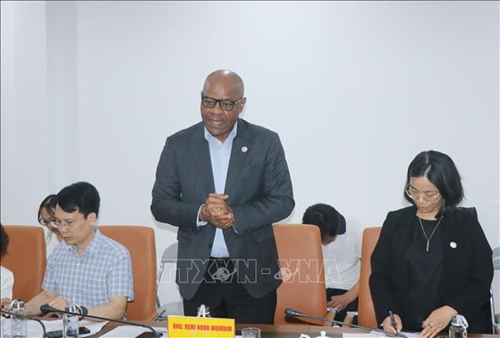The FFF is carried out in Bac Kan province in three phases, with the first one in Chu Huong and My Phuong communes of Ba Be district during 2014-2017, the second in Phuong Vien commune of Cho Don district and My Phuong and Yen Duong communes of Ba Be district during 2018-2022, and five communes in Ba Be, Cho Moi and Cho Don districts during 2023-2025.
    |
 |
|
FAO representative in Vietnam Rémi Nono Womdim speaks at the meeting with Bac Kan leaders. |
Chairman of the provincial farmers’ union and head of the FFF management board Cao Minh Hai said that the facility has contributed to improving management capacity, promoting mechanisms and policies related to cooperatives through multi-sectorial forums, and enhancing business capacity and market and capital access of the cooperative groups.
He particularly stressed that the program has helped local cooperatives respond to climate change through raising their awareness of the environment and improve their equal access to cultural and social services.
FAO representative in Vietnam Rémi Nono Womdim recommended the province continue support policies for sustainable development of local agriculture and forestry, branch out agro-tourism and experience tourism to create better income for locals, and integrate support programs and projects so that cooperatives could capitalize on their advantages to shape up competitive products.
    |
 |
|
FAO delegation visits some models of cooperatives in Ba Be district. |
FAO will continue its support programs for Bac Kan’s cooperatives, with a focus on developing clean agricultural model integrated with experience tourism, he added.
Vice Chairman of the provincial People’s Committee Nong Quang Nhat thanked FAO for its assistance over the past time, expressing his hope for further support in the fields of eco-tourism, sustainable forest development and protection, among others, from the organization in the coming time.
Bac Kan is now home to more than 374,000 hectares of forest, with the forest coverage topping 73% in 2023, the highest level in the country. The province has given weight to forest management, protection and restoration, contributing to local socio-economic development and improvement in local livelihoods.
Source: VNA